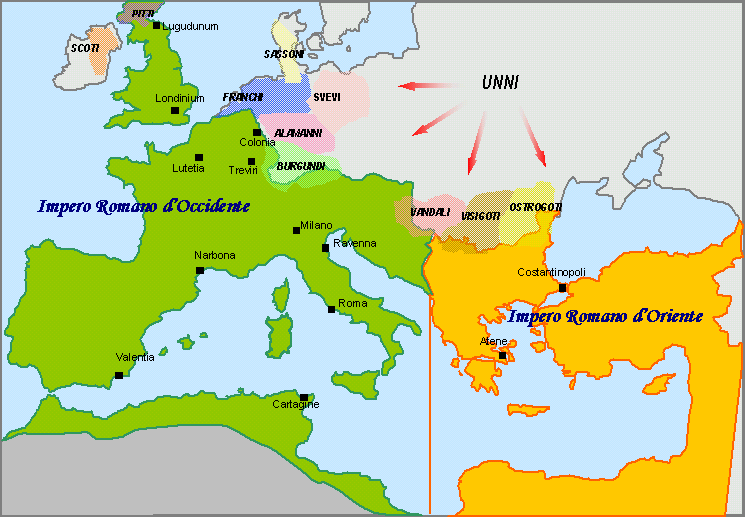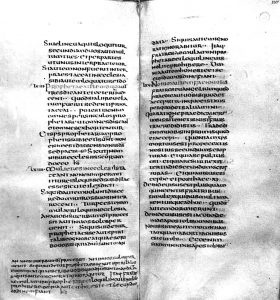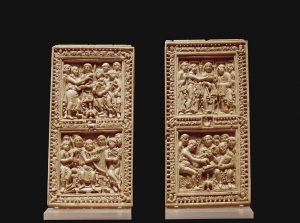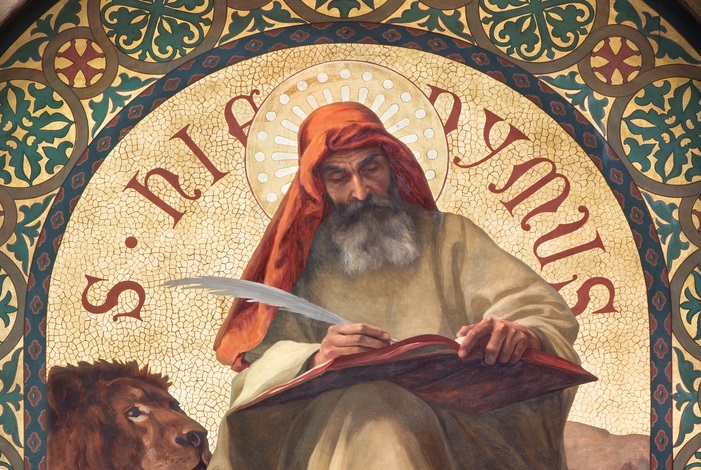
390 AD to 410 AD, Psalm 67: The Vulgate.
This site was first built in French (see www.147thgeneration.net). The English translation was mainly done using « google translation ». We have tried to correct the result of this translation to avoid interpretation errors. However, it is likely that there are unsatisfactory translations, do not hesitate to communicate them to us for correction.
(for that click on this paragraph)
Summary
This generation is from the years 390 AD to 410 AD.
According to our count, this generation is the 67th generation associated with Psalm 67. It is in this Psalm 67 that we therefore find an illustration of the facts of this generation.
When Theodosius I The Great died, the empire was once again divided between East and West. The Huns take Antioch and the Visigoths take Athens. The Goths temporarily occupied Constantinople before being massacred.
Arcadius, the first emperor of Byzantium, to preserve his empire, made a pact with « barbarian » peoples. Its advent marks for many the end of antiquity and the beginning of the Middle Ages.
During this generation, the new power, although officially adopting Christianity, remains benevolent towards Judaism even if the religious power tries to fight against it. Power continues to attack paganism while preserving Judaism.
In this relative peace, the event that marks this generation comes from the Christian side by the writing of the Vulgate by Jerome. Jerome’s work is more faithful to the Hebrew text than the Septuagint, used until now.
Talk
The succession of Theodosius I the Great
This generation sees first the end of the reign of Theodosius I The Great (346-395).
At his death his empire is divided between his two sons Arcadius, for the east and Honorius for the West, which will definitively end the unity of the Roman Empire.
These sons too young to govern, it will be actually two other characters who will drive the two halves of the empire: Stilicon to the west and Rufin to the east.
End of antiquity
At the same time the pressure of the Huns taking Antioch and that of the Visigoths who take Athens intensified. Eutrope succeeds Rufin. The Goths temporarily occupy Constantinople before being massacred in 400,
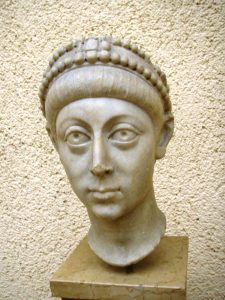
Arcadius becomes the master of the empire of the East, he increases the pressure on paganism.
Arcadius, the first emperor of Byzantium, to preserve his empire, made a pact with « barbarian » peoples. Its advent marks for many the end of antiquity and the beginning of the Middle Ages. His son Theodosius II will succeed him at the age of seven when he died in 408.
During this generation, the new power, although officially adopting Christianity, remains benevolent towards Judaism even if the religious power tries to fight against it. Power continues to attack paganism while preserving Judaism.
This benevolence of political power towards the Jews allows them at least for this generation to live in a certain tranquility. We already know that this will not be eternal and that the next Jewish generations will be much less protected in the Christian world.
Jerome
In this relative peace, the event that marks this generation comes from the Christian side by the writing of the Vulgate from 391 to about 405 by Jerome:
- The [1] Christians of the Latin world used very early Latin translations of the Greek version of the Jewish Bible (the Septuagint) as well as the New Testament, originally written in Greek. We talk about this type of translation of Vetus latina (« old Latin »).. In the fourth century, this Latin Bible is considered imperfect. Jerome, during his stay in Rome (382-385), had already begun a revision of the translation of the Gospels. Based in Bethlehem, in 386, Jerome first intends to revise the Latin translation of the Septuagint from the Hexaples of Origen (Bible in six columns, four Greek and two Hebrew versions). Then, in the 390s, he began a new translation of the Old Testament from the Hebrew text, the only one inspired in his eyes. He did not reach the end of this translation which was continued by others. This return to « the Hebrew truth », to the detriment of the Septuagint, did not fully prevail until the seventh century. Designated from the 13th century as vulgata versio, « a commonly used text », the Vulgate was declared an authentic translation by the Council of Trent in 1546. It essentially includes Jerome’s translations of Hebrew and its revisions of the Gospels. but also other Latin translations that are not of him. A modern Latin version, called Nova Vulgata, was promulgated by John Paul II in 1979.
Jérôme’s work will be important in the « rewriting » of texts:
- Well [2] that it is neither of Palestinian origin, nor of Greek language, it is here that we must mention Jerome, one of the most important Latin fathers of the century, with Augustine and Ambroise. Born in Dalmatia around 345, Jerome indeed spent in Bethlehem the second half of his life (386-419 / 420), after having spent ten years in Antioch and other places in the East, where he lived. is tried a time to the hermitical life, then to Rome. He is the author of a monumental work: commentary on writing (all the prophets – as well as the « commentary on Jonah », several other books of the Old and New Testaments, as well as the « commentary on St. Matthew ») , historical works (chronic), hagiographies, pamphlets (apology against Rufin), Letters. On the other hand, his great title of glory was to make the first Latin translation of the Hebrew Bible; He also translated into Greek some works of Greek theologians (Origen, Didyme the Blind).
Jerome’s work is more faithful to the Hebrew text than the Septuagint, used until now.
His translation of some verses used so far by Christian exegeses to justify the Messianic reality of Jesus from the Old Testament is more neutral. He [3] avoids using the term « virgin » in the place of « young girl » in Isaiah 7:14, and similarly, he does not include any of the « Christian » translations of Psalm 22,17 such as « They have pierced my hands and feet « or » like a lion are my hands and my feet « .
Just as the Septuagint had been « celebrated » by the psalmist (see Psalm 33, relating to the generation of the editorship of this version), the writing of this new version that will allow nations to come closer to God is also welcomed. The Septuagint version had allowed the nations, then completely pagan, to know the monotheistic faith; but, also, had served as a support for the faith of many Hellenized Jews not comprehending the original Hebrew texts.
For the Vulgate, only nations, adhering to Christianity are involved; it will be of no use to the Jews.
On the other hand, it will be widely used in the controversies between Jew and Chrétien to explain the degradation of the Jewish people and the final invalidation of his election for the benefit of the new Israel represented by the Christians.
It is the division between the hope that the nations will be enriched a little more by the divine knowledge through the contribution of the Vulgate by Jerome, and the fear that the rise of these same nations will weigh on the future of Israel that the psalm of this generation evokes:

- For the conductor, on neginoth; a psalm, a song.
- God will be gracious to us and bless us; He will cause His countenance to shine with us forever.
- David begins this psalm by remembering the grace of God, so that the contribution to the nations will not be fatal to the people of Israel.
- That Your way should be known on earth, Your salvation among all nations.
- Peoples will thank You, O God; peoples will thank You, yea, all of them.
- Kingdoms will rejoice and sing praises, for You will judge peoples fairly, and the kingdoms-You will lead them on earth forever.
- Peoples will thank You, O God; peoples will thank You, yea, all of them.
- After this reminder, David salutes the new steps of the nations towards God through this new contribution which will not fail to bring them closer to God. Moreover, among the songs that nations will sing, the psalms of David will hold a place of honor.
- The earth gave forth its produce; God, our God, will bless us.
- God will bless us, and all the ends of the earth will fear Him.
- David, concludes this psalm as he has initiated it, he greets the openness of the nations to God but does not forget to remember that the Jewish people must not pay the price.

[1] According to Encyclopedia Universalis / article: « Vulgate of Saint Jerome, 391-405 approximately »
[2] Pierre Maraval: « Christianity from Constantine to the Arab conquest » / Chapter: « The expansion of Christianity / Christian expansion in the East » (French: Pierre Maraval/Le Christianisme de Constantin à la conquête arabe/Chapitre : « L’expansion du christianisme/L’expansion chrétienne en Orient » (p.77/78) ).
[3] According to: (texts presented by) Marie Françoise Baslez: « The early times of the Church » / Chapter: « The Church and the State » (French: Suivant (textes présentés par) Marie Françoise Baslez : « Les premiers temps de l’Église »/Chapitre : « L’Église et l’État » (p.755) ).

